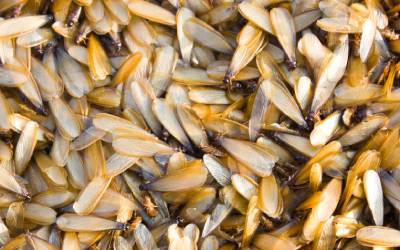Whether you’ve recently bought your first indoor plant or you’re a houseplant aficionado, the presence of pests near (or on) your plants can be any plant parent’s worst nightmare. These plant pests can appear overnight in hoards, making it difficult to know where they came from in the first place. Like most pests, these insects are drawn to excess moisture. This is why they commonly infest houseplants in Tennessee homes. At Garrie Pest Control, we know how frustrating it can be to find these minuscule insects all over your beloved indoor plants. Keep reading to learn about the most common ones we deal with.
5 Common Houseplant Insects
1. Aphids
While you can usually spot the arrival of aphids on houseplants while they’re still relatively harmless, they can multiply quickly, forming thick clusters under leaves, on flower buds, or on the newly grown tips. Usually, they are green, but aphids can also be orange, yellow, brown, or even black. As they feed on the sap, they can cause yellow, misshapen leaves, and a generally unhealthy appearance. Once spotted, they need to be eradicated immediately. Usually, spraying the plant with water will be enough to dislodge them, although insecticidal soap is effective as well.
2. Mites
Extremely small and very hard to spot, mites are actually more closely related to spiders than they are to insects. In fact, they’re so small, usually, the first sign of their presence will be noticed in the white webbing you’ll find wrapped around stems and leaves. Another way to tell if a plant has mites is if you notice the leaves are sickly and mottled. If you notice this or small bits of silky web hanging from the leaves, spray the plant up and down. This will dislodge the mites while destroying their webs.
3. Scales
Scales are parasites that you first might notice as brown or white bumps on stems, or gathering near the surface and undersides of leaves. Feeding on plant sap, they’ll leave a sticky residue commonly known as “honeydew”. This honeydew can lead to mold growth which can harm the plant, and result in poor indoor air quality. If you spot the formation of scales, they can be simply rubbed off in their early stages. If you’ve done this already, and they won’t go away, it’s recommended that you spray the plant with insecticidal soap.
4. Whiteflies
Powdery white in appearance — and resembling tiny moths — whiteflies can infest a plant, stunting its growth, and turning the leaves yellow. If you don’t notice the whiteflies on the plant itself, one way to know if a plant is infested is if the plant is disturbed, you’ll see a white cloud as the whiteflies flutter about before resettling on the plant. Spraying with water will kill or dislodge the whiteflies, and if that doesn’t work, then spraying with insecticidal soap should rid you of the problem.
Need Help Getting Rid of Houseplant Pests?
Simply keeping track of your plants’ health should be enough to keep them safe from pests. If, however, the problem is particularly severe — or persists over time — and you require help, the experts at Garrie Pest Control can help. We’ve been helping families eliminate their pests since 1972, and offer comprehensive pest control solutions designed to keep your home free from unwanted houseguests. Contact us today to get started!


